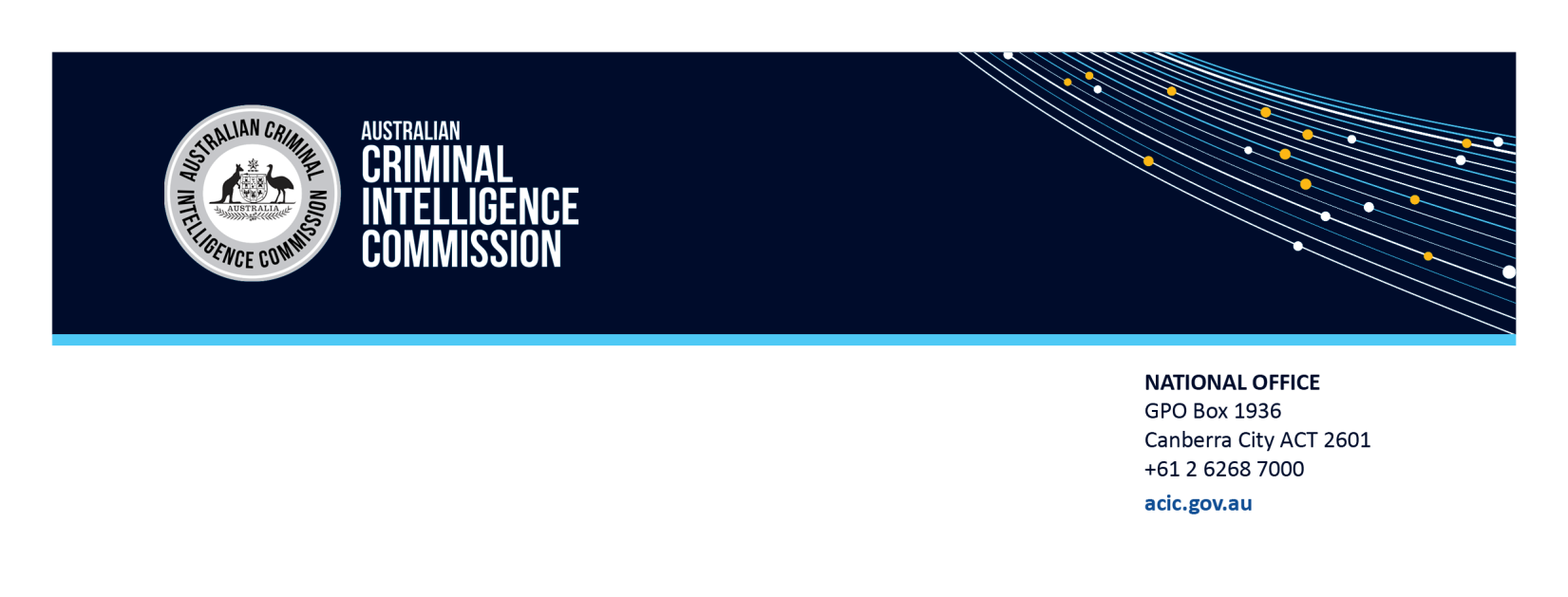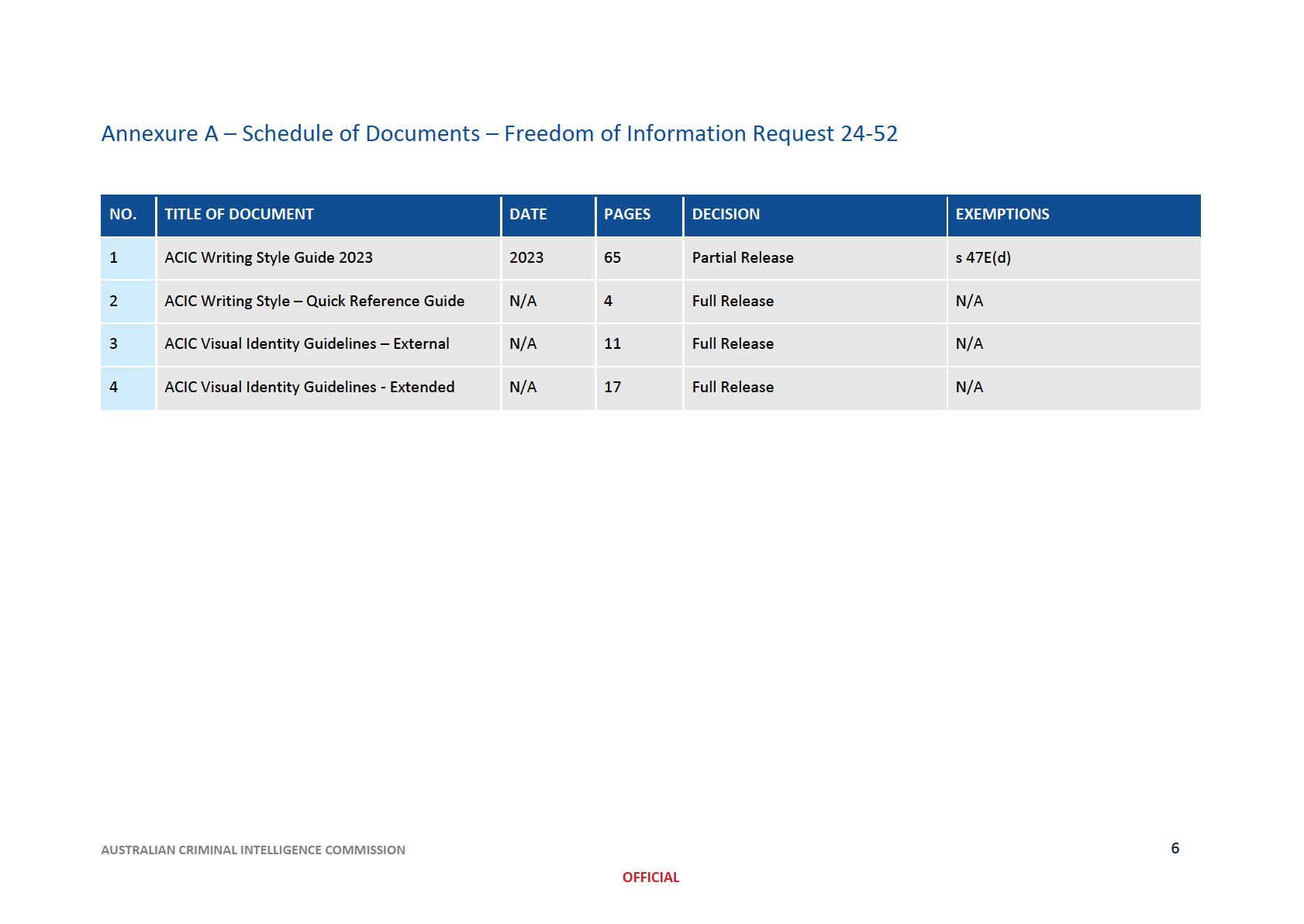 OFFICIAL
OFFICIAL
Our reference: CM:
24/256113
25 November 2024
Mr Glenn Hamiltonshire
By email: xxxxxxxxxxxxxxxxxxxxxxxxxx@xxxxxxxxxxx.xxx.xx
Dear Glenn,
FREEDOM OF INFORMATION REQUEST – FOI 24-52 – DECISION ON ACCESS
On
24 October 2024, you made a request to the Australian Criminal Intelligence Commission (
ACIC)
under the Freedom of Information Act 1982 (Cth) (
FOI Act) for access to:
‘
The Style Guides/Brand Guides/Writing Guides currently used for the Australian Crime
Commission.'
We acknowledged your request on
30 October 2024 and indicated that a decision was due to you by
23 November 2024. However, as this falls on a Saturday, in accordance with s 36(2) of the
Acts
Interpretation Act 1901, the decision may be made on the next business day, being
Monday 25 November 2024.
This is a decision made under the FOI Act in relation to documents within the scope of your request.
Authority and materials considered
I am authorised under s 23 of the FOI Act to make a decision concerning the information you have
requested access to.
In reaching my decision, I have taken into consideration:
• the relevant provisions of the FOI Act;
• the nature of the documents that would fall within the scope of your request, if they existed;
• advice from officers with responsibility for matters to which your request relates;
AUSTRALIAN CRIMINAL INTELLIGENCE COMMISSION
1
• relevant guidelines issued by the Office of the Australian Information Commissioner (the OAIC
Guidelines);1 and
• relevant Tribunal and Federal Court decisions concerning the operation of the FOI Act.
Documents Identified
I have identified four (4) documents as matching the description of your request. Details of these
documents are set out in
Annexure A.
Decision
I have decided to release three (3) documents to you in full, and one (1) document in part, with
redactions applied to material that is exempt under s 47E(d) of the FOI Act.
Reasons for Decision
Section 47E(d) of the FOI Act – Public interest conditional exemptions – Operations of an agency
Under s 47E(d) of the FOI Act a document is conditionally exempt if its disclosure would or could
reasonably be expected to have a substantial adverse effect on the proper and efficient conduct of the
operations of an agency.
The ACIC’s statutory functions are outlined in section 7A of the
Australian Crime Commission Act 2002
(Cth) (ACC Act) and relevantly include the collection, correlation, analysis and dissemination of criminal
intelligence (s7A(a), ACC Act).
Material in Document 1 that is redacted and marked ‘s 47E(d)’ reveals methodologies and procedures
used by the ACIC in the performance of its intelligence functions. These methods and procedures are
critical to the ACIC’s proper and efficient conduct as Australia’s national criminal intelligence agency,
and particularly the ACIC’s ability to collect, correlate, analyse and disseminate criminal information
and intelligence.
Disclosure of the lawful methods and procedures would or could reasonably be expected to prejudice
the ACIC’s, and its intelligence and law enforcement partners’ ability to properly exercise lawful
investigative and intelligence functions by revealing intelligence capabilities and methodologies. I have
therefore considered that the disclosure of this information would substantially and adversely affect
the proper and efficient conduct of the operations of the ACIC and that it is exempt from release under
s 47E(d) of the FOI Act.
As such, I have decided material relevant to your request is exempt material pursuant to s 47E(d) of the
FOI Act as set out at
Annexure A.
Public interest considerations
Section 11A(5) of the FOI Act requires that the ACIC must give access to documents that are
conditionally exempt unless such access would, on balance, be contrary to the public interest. The
1 Available in full a
t: Freedom of information guidelines | OAIC.
AUSTRALIAN CRIMINAL INTELLIGENCE COMMISSION
2
OFFICIAL
public interest test for the conditional exemptions referred to above requires the ACIC to weigh the
competing public interests and decide where the balance lies.
There are a number of public interest factors favouring access in this instance. They are that disclosure
would:
(a) promote the objects of the FOI Act;
(b) allow a person to access his or her personal information;
(c) provide the Australian community with access to information held by the ACIC;
(d) increase scrutiny, discussion, comment and review of the ACIC’s activities; and
(e) enhance the accountability of the ACIC’s decision-making.
However, there are a number of other factors that would render the release of this information as
contrary to the public interest in this instance. These are that release could:
(a) compromise the proper and efficient conduct of the operations of the ACIC;
(b) prejudice the ACIC’s ability to obtain confidential and valuable information in the course of
performing its statutory functions;
(c) prejudice the ACIC’s, and its intelligence and law enforcement partners’ ability to properly
exercise lawful investigative and intelligence functions by revealing intelligence capabilities and
methodologies;
(d) prejudice the ACIC’s ability to collect, correlate, analyse and disseminate criminal
information and intelligence;
(e) prejudice the ACIC’s ability to use similar methodologies and procedures in the future; and
(f) prejudice security, law enforcement and public safety.
On balance, I consider that the public interest factors against the disclosure of the conditionally exempt
information within the documents outweigh the public interest factors in favour of disclosure. I have
reached this conclusion because of the importance of the ACIC being able to effectively perform its
function to combat serious and organised crime through the production of quality intelligence. The
ACIC’s remit is the highest priority serious and organised crime. Serious and organised crime is a
significant threat to the community and the disclosure of information which hinders the ACIC’s ability to
disrupt that crime through its law enforcement and intelligence functions weighs considerably against
the public interest.
Disclosure log
Section 11C of the FOI Act provides that information about any documents released under that Act
must be published on the ACIC’s website within 10 days of release, subject to the exemptions set out in
subsections 11C(1)(a)-(d). The information released to you will be uploaded to the ACIC Disclosure Log.
AUSTRALIAN CRIMINAL INTELLIGENCE COMMISSION
3
OFFICIAL
Your review rights
If you are dissatisfied with this decision, you can apply for internal review or review by the Information
Commissioner. You do not have to apply for internal review before seeking the Information
Commissioner’s review.
Internal Review
You may seek internal review by making an application in writing to the ACIC within 30 days of being
notified of this decision. A written application for a review should be sent to the FOI Coordinator at
xxx@xxxx.xxx.xx, or by post to:
FOI Coordinator
Australian Criminal Intelligence Commission
GPO Box 1936
Canberra ACT 2601
Information Commissioner
Alternatively, you may apply in writing for review by the Information Commissioner. In making your
application, you need to provide:
• an address for notices to be sent (this can be an email address); and
• a copy of this decision.
It would also help if you set out the reasons for review in your application. Requests for review must be
in writing and can be made via the website
(www.oaic.gov.au), by email a
t xxxxxxxxx@xxxx.xxx.xx, or
by post at:
Office of the Australian Information Commissioner
GPO Box 5128
Sydney NSW 2001
If you are objecting to a decision to refuse access to documents you must apply to the Information
Commissioner within 60 days of being given notice of the decision. You can contact the Information
Commissioner by phone on 1300 363 992.
Right to complain
You may make a complaint to the Information Commissioner about action taken by the ACIC in relation
to your application. The complaint needs to be in writing an identify the agency against which the
complaint is made.
The Information Commissioner may be contacted on 1300 363 992. There is no particular form required
to make a complaint, but the complaint should set out the grounds on which you consider the action
should be investigated.
AUSTRALIAN CRIMINAL INTELLIGENCE COMMISSION
4
OFFICIAL

Yours sincerely,
Lauren P.
Position No. 50003458
Authorised Decision Maker
Australian Criminal Intelligence Commission
AUSTRALIAN CRIMINAL INTELLIGENCE COMMISSION
5
OFFICIAL

Annexure B – FOI Act Extracts
47E Public interest conditional exemptions—Operations of an agency
A document is conditionally exempt if its disclosure under this Act would, or could reasonably be
expected to, do any of the following:
(a) prejudice the effectiveness of procedures or methods for the conduct of tests, examinations
or audits by an agency;
(b) prejudice the attainment of the objects of particular tests, examinations or audits conducted
or to be conducted by an agency;
(c) have a substantial adverse effect on the management or assessment of personnel by the
Commonwealth or by an agency;
(d) have a substantial adverse effect on the proper and efficient conduct of the operations of an
agency.
Note: Access must generally be given to a conditionally exempt document unless it would be
contrary to the public interest (see section 11A).
11B Public interest exemptions – factors
Scope
(1) This section applies for the purposes of working out whether access to a conditionally exempt
document would, on balance, be contrary to the public interest under subsection 11A(5).
(2) This section does not limit subsection 11A(5).
Factors favouring access
(3) Factors favouring access to the document in the public interest include whether access to the
document would do any of the following:
(a) promote the objects of this Act (including all the matters set out in sections 3 and 3A);
(b) inform debate on a matter of public importance;
(c) promote effective oversight of public expenditure;
(d) allow a person to access his or her own personal information.
Irrelevant factors
(4) The following factors must not be taken into account in deciding whether access to the
document would, on balance, be contrary to the public interest:
(a) access to the document could result in embarrassment to the Commonwealth
Government, or cause a loss of confidence in the Commonwealth Government;
(b) access to the document could result in any person misinterpreting or misunderstanding
the document;
(c) the author of the document was (or is) of high seniority in the agency to which the
AUSTRALIAN CRIMINAL INTELLIGENCE COMMISSION
7
OFFICIAL
request for access to the document was made;
(d) access to the document could result in confusion or unnecessary debate.
Guidelines
(5) In working out whether access to the document would, on balance, be contrary to the public
interest, an agency or Minister must have regard to any guidelines issued by the Information
Commissioner for the purposes of this subsection under section 93A.
AUSTRALIAN CRIMINAL INTELLIGENCE COMMISSION
8
OFFICIAL


